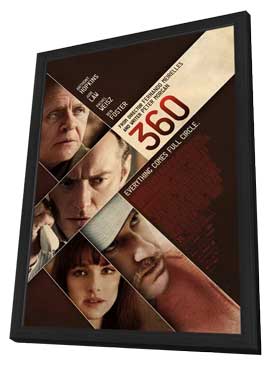
360
UK, 2011, 110 minutes, Colour.
Anthony Hopkins, Rachel Weisz, Jude Law, Jamal Debbouze, Lucia Siposova, Gabriela Marcinkova, Ben Foster, Moritz Bleibtreu.
Directed by Fernando Meirelles.
Not exactly a perfect circle, one episode leading into the next and then the next…, even though this film takes its inspiration from Arthur Schnitzler’s La Ronde. Rather, there are all kinds of interconnections within the circle – which does lead us back to where we started. And that is with a Slovakian woman posing for a photographer who is, in fact, a pimp, sending her out on an assignation which leads us to a British businessman, Jude Law. But the scene shifts to Paris and another story, and to the United States where a convicted sex offender is being transferred to a parole situation. And so on. By the end, we have discovered the various degrees of separation and the surprising degrees of connection.
Some of the episodes are quite dramatic, others much milder. The latter is particularly true, unfortunately, of the British episode with Jude Law and Rachel Weisz as unfaithful husband and wife who rediscover something between them. Perhaps the most interesting story centres on Ben Foster as the sex offender - Foster seeming to specialise on repellent characters (3:10 to Yuma, The Mechanic). Delayed at Denver airport by snow, he is tense, wary of re-offending, chatting to a young Brazlian woman, returning home after a bad relationship with a photographer in London (who was having an affair with Rachel Weisz, so one begins to see connections and tangles) who is very confronting, alarming him. She had been sitting next to Anthony Hopkins on the flight. And so on.
The screenplay is by Peter Morgan who has shown more insight and versatility in his political dramas, The Deal, The Special Relationship, The Last King of Scotland, The Queen. One arresting sequence concerns Anthony Hopkins at an AA meeting. His words might have been written by Hopkins himself about his own recovery from alcoholism decades earlier. He then pays tribute to a priest who had helped him considerably, a Jesuit who alerted him that he would have a moment of grace and would recognize it. Quite a positive image of a priest for contemporary films.
It is the actors from Eastern Europe who make an impact, especially in a climax that is a combination of exploitation, violence, romanticism, and undeserved luck.
More of a time-passing entertainment than a study of human nature.
1. The work of the director, the writer, their combination?
2. The title, not a La Ronde story but degrees of separation and connection? 360 degrees and the circle?
3. An international production, emphases, Austria, France, the UK, US, Brazil?
4. The international cast? The range of languages? Music styles? Songs? The credibility of the stories and their connections?
5. The situations, the characters, the connections, coincidences?
6. The manner of storytelling, the episodes, the links, the interconnections, the revelations?
7. The emphasis on sexuality, fidelity, infidelity, prostitutes and pimps, clients? Photographers, models? International rings? Platonic love and disappointments? Families? The sexual offender? The provocative aspects of the film, daring? Chances and risks? Running away from the truth? Deaths? Alcoholics Anonymous? The business world? Psychology and counselling?
8. The introduction, Mirka, the photos, the photographer, the poses, the money? Anna, Mirka’s sister, the Slovakian background? Willing to help, not? Vienna and Bratislava? The family? The reaction of the parents? Mirka and her rebellion? The job, the bar, meeting the businessmen? The setup? The salesmen and their contacts? The Russian, the hotel, the time, texting? The violence, the money, leaving?
9. Michael, the book, the bar, his being caught out, the appointment with the prostitute, open to blackmail, the deal, the phones, his loneliness, his ringing home?
10. Rose, the photos, Rose with her lover, talk, sexual encounter, going home, getting ready for her husband, playing with her daughter, at work, the jobs, the photographer, the later connections? Berlin, the salesman Michael and the possibility of reconciliation?
11. Paris story, the cab, the airport, Valentina, going to the counsellor, the discussions with the imam, the Muslim conceptions of sin? Advice, the psychiatrist, permissive? The dentist not? Telling Valentina, watching her leave?
12. Tyler and the counsellor, ready for parole or not, granted? His character, hard? Survival in an all-male situation, the transition, the airport, the snow, the plane held up? The phone and touching his shoe? Meeting Laura, his being careful, the puzzle, the drinks, going to the phone, checking with the officer? The PA? Laura, the audience knowing her, the explanation, her going to the room with Tyler, feeling rejected? Reaction, the bathroom, masturbation, the washing? The audience questions? Affirmed, the choice? A moment of grace and Laura being saved?
13. John and Laura, their talking on the plane, her story about herself and her boyfriend, his infidelity (and the link to Rose)? From Brazil? John, his story, the affair, his daughter, her leaving, her ultimatum, his not knowing whether she was dead or not? Going to Phoenix, to identify the body, the bond with Laura, at the airport, the note? In Phoenix, the AA meeting, his story, his story about the Jesuit, the prayer, the issue of a moment of grace, accepting?
14. Valentina, at the AA meeting, the story, her boss, returning? The husband and the clash? The divorce? John and his hopes?
15. Sergei, the phone, relationship with Valentina, obeying the Russians, driving? His English lessons? The meeting at the airport, the rebuke, checking Mirka, Mirka and her client, time up, texting – and the ensuing violence?
16. Sergei, the car, meeting Anna, her questions, the car and the rain, their driving, talking, the return? The phone call, the lie, the killing? Risking everything and going with Anna?
17. An existential film, life, the forks in the road – and which ones taken? A satisfying two hours of stories and issues and morals?